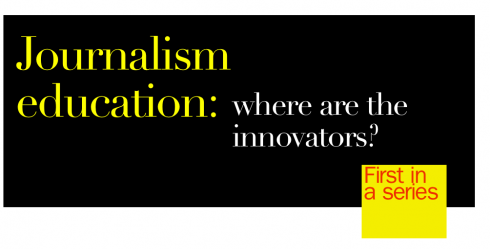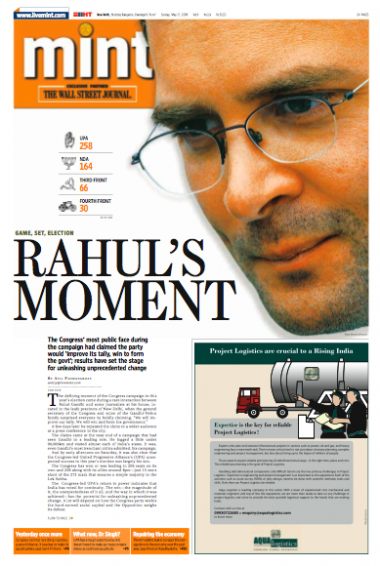
Although I am no longer in academia, my interest in the subject of journalism education remains at high levels. I have served as a professor at both Syracuse University’s S.I. Newhouse School of Public Communications (New York), as well as the University of South Florida, in Tampa. In addition, I have spent a considerable part of my career at The Poynter Institute for Media Studies, with which I am still involved as an associate faculty member. My experiences in these institutions have been rich, and highly rewarding. I am in touch constantly with a legion of former students, who have gone on to forge successful journalistic careers.
This part of my job—-teaching, mentoring and nurturing new generation of media practitioners—is one of my favorites, which is why I am devoting space in my blog to the subject of innovation in journalism education.
If my academic experience is any indicator, I know that as far as most journalism schools and colleges are concerned, progress and innovation are more likely to come from individual professors who make it a point to use their classrooms as special laboratories for experiments and discussions of the craft. It is more difficult to develop new strategies of innovation——and especially to alter the curriculum!—at the “official” level. You put 40 journalism professors in one room to discuss innovation and curriculum change—-or anything, for that matter—- and it will take a long time for consensus to be reached, UNLESS things have changed very dramatically since the 1990s, when I last participated in such academic gatherings.
I remember faculty meetings at both Syracuse and South Florida as long, somewhat political—-may I say boring?—-and not very conducive to innovative conclusions. However, at both institutions (whose programs I consider excellent), I found plenty of colleagues who had decided that the microcosm of their classroom, their desire for change, and their students, was all they needed to carry out inventive teaching. These professors advanced their craft, produced students who were ready to tackle the profession with a keen sense of curiosity, and did this in spite of what the official curriculum stated. I learned much from such colleagues.
Case in point: While at Syracuse, I was a young professor in a department still called “graphic arts”, with course descriptions that went back to the days of hot type. It was the late 1970s, and the industry was quickly changing technologically, while the lab we worked in was not yet there. Nonetheless, I adapted my courses to the new realities, not the catalog descriptions. True, you were surrounded by some of the old colleagues on the verge of retirement who turned the other cheek to progress, but in your classroom you were king, and your students were the perfect audience to think big and move forward. I know we did.
Please let me know if this is still the same. And, of course, I apologize in advance to any academics who may feel insulted by my statements here.
Program emphasizes business models, the craft
The new MA in Online Journalism at Birmingham City University is a project dear to Professor Paul Bradshaw, who has written us with details of the program. Paul writes about it in his blog, and describes the new degree, to be launched in September, as one which emphasizes : Enterprise; experimentation; community; creativity.
I am sure many colleges and universities worldwide are developing this type of necessary program, especially at the graduate level. I am impressed by the fact that the program is not limited to journalistic techniques, but also includes business models for online journalism—-something the industry desperately needs.
In Paul’s words; In the Online Journalism MA’s first stage (Certificate) students will study Journalism Enterprise. This will look at business models for online journalism, from freemium to mobile, public funding to ad networks, alongside legal and ethical considerations. I’m thinking at the moment that each student will have to research a different area and present a business case for a startup.
However, the program also takes students into Newsgathering, Production and Distribution.
I’m not teaching them separately because, online, they are often one and the same thing. And as students should already have basic skills in these areas, I will be focusing on building and reinventing those as they run a live news website (I’ll also be involved in an MA in Social Media, so there should be some interesting overlap).
The second stage of the MA Online Journalism (Diploma) includes the module that Paul says he is most excited about: Experimentation.
This is an explicit space for students to try new things, fail well, and learn what works. They will do this in partnership with a news organisation based on a problem they both identify (e.g. not making enough revenue; poor community; etc.) – I’ve already lined up partnerships with national and regional newspapers, broadcasters and startups in the UK and internationally: effectively the student acts as a consultant, with the class as a whole sharing knowledge and experience.
The final stage is MA by Project – either individually or as a group, students make a business case for a startup or offshoot, research it, build it, run it and bid for funding.
I asked Paul if he experienced any difficulties getting this program approved by his academic superiors:
I’ve been lucky not to have too many difficulties in creating the MA – that’s largely due to timing; I’ve been talking about an MA like this for years but this year the university saw that this was worth doing and the School of Media was also looking at launching a suite of new MAs – so we’re also doing new MAs in Freelance Journalism and Journalism Enterprise ; and Social Media , and there are great opportunities for students and staff to mingle and share overlapping knowledge and projects there.
For information MA in Freelance Journalism and Journalism Enterprise
[
http://www.mediacourses.com/courses.asp?cat=2&courseID=33
For information MA in Social Media
http://www.mediacourses.com/courses.asp?cat=2&courseID=30
By the way, Paul Bradshaw, Senior Lecturer, Online Journalism and Magazines, puts his Online Journalism lessons online. Those interested can find them here: http://onlinejournalismblog.com/tag/classes/
TO COME: We will continue to blog about the state of Journalism Education worldwide. We welcome your comments and information. Scroll down below.
MINT and Indian elections

MINT, the two-year old financial daily of India, scored another first Sunday when it published its first ever Sunday edition to cover the elections in India. It treated the front page as a magazine cover, with a dramatically cropped photo of Rahul Ghandi, son of Sonia Ghandi, whose party, the Indian National Congress, scored a big victory with its allies, making this Rahul Ghandi’s first big political coming out moment.
“The son rises,” claimed the MINT lead article.
In a perfect example of convergence of print/online, with each medium doing what it can do best, MINT editors published an e-book, titled “The Election Files” which readers/users could download at the newspaper’s website, www.livemint.com/ebook, featuring articles, essays, video and audio
Related link:
– India: Mint eastward bound, to launch in Kolkata on May 25
http://www.exchange4media.com/e4m/news/fullstory.asp?section_id=5?ws_id=34784&tag=30121?ct=0
![]()
The following links may be of special interest to you, as they all deal with topics that we discuss in this forum all the time.
– How the newspaper industry threw away its lead in online search engines
http://www.ojr.org/ojr/people/robert/200905/1726/
– INMA World Congress: Jeff Jarvis insists “we have to redefine utterly what a newspaper is”
http://www.editorsweblog.org/newspaper/2009/05/inma_world_congress_jeff_jarvis_insists.php#more
– UK: Saving journalism, a farthing at a time
http://www.guardian.co.uk/commentisfree/2009/may/18/news-online-payment-journalism
– USA: Geffen Is Seen as Still Eager for Times Stake
http://www.nytimes.com/2009/05/16/business/media/16times.html
– USA: Tucson Paper to Stop Printing Saturday
http://www.nytimes.com/2009/05/16/business/media/16paper.html
– USA: ‘New York Times’ Considering Two Paid Web Options
http://www.editorandpublisher.com/eandp/news/article_display.jsp?vnu_content_id=1003973529
– Thai political group starting newspaper
http://www.upi.com/Top_News/2009/05/15/Thai-political-group-starting-newspaper/UPI-53231242414043/
– Canada: Online Newspaper Readership Up Sharply in Toronto
http://www.editorandpublisher.com/eandp/departments/online/article_display.jsp?vnu_content_id=1003973288
– How The West Australian hopes to win online
http://www.theaustralian.news.com.au/story/0,25197,25497201-7582,00.html
– Charging for Online Content, the ‘Financial Times’ Way
http://www.editorandpublisher.com/eandp/news/article_display.jsp?vnu_content_id=1003973617
– Amazon brings blog publishing to the Kindle
http://www.vnunet.com/vnunet/news/2242324/amazon-brings-blog-publishing
J-schools and new industry challenges: seeking information
I am delighted with the reaction elicited by my call for information on how J-schools adapt their curriculum to the new changes in our industry, and, particularly to teach storytelling techniques in a multi platform world. Many of you have written, including Randy Stano, of the University of Miami, who reports that “we are rewriting all of our curriculums. no one can seem to keep up with the changes.”
Also Leslie-Jean Thornton of Arizona State University’s Cronkite School of Journalism and Mass Communication, who writes: “We’re pretty sure we’re on the right track here at the Cronkite School. There are more than a few of us teaching that. “
I am planning to talk to Leslie-Jean and Randy, as well as a dozen other academics who have written to me offering information. Stay tuned.
Here is the link to an informative article from Jeremy Gilbert, assistant professor at Northwestern University’s Medill School of Journalism. Jeremy, a rising academic star whom we had the pleasure of meeting at the Poynter Institute for Media Studies first as a Poynter Fellow, then as a faculty member, tells us about Medill’s Spring New Media Publishing Project, where students work with professionals to create tools that will help the industry cope with change:
Experimentation will help save journalism. Unfortunately, major news organizations’ business models are failing and research is one of the first things to go.
But journalism schools and students have the time and resources to experiment with solutions to the major disruptive changes rattling the industry. New approaches to information gathering and analysis are needed for journalism to flourish. We must build new tools for the creation and consumption of news.
For full article: http://www.poynter.org/content/content_view.asp?id=162857
How are the J-schools training the next wave of storytellers?
I am exploring the question myself. As a former academic (is one ever a FORMER academic?) having taught at both Syracuse University and the University of South Florida for many years, as well as assorted stints and Master classes at a variety of universities worldwide, I am keen on finding out how the curricula of journalism schools adapts to the new realities of our industry. From writing to editing and visual presentation, the game has changed dramatically, and I am sure that the best and most avant garde professors out there are already incorporating multi platform storytelling into their courses.
Please let me know who you are. I would like to write a series of blogs on the subject, profile those colleges and universities who are doing it right, and talk to the professors and perhaps even the students in such programs.
Counting on you to help me here. If you are participating in the programs I describe here, or if you know someone who does, please let me know via email: mario@garcia-media.com
Follow the Marios

Two Marios. Two Views.
Follow Mario Jr. and his blog about media analysis, web design and assorted topics related to the current state of our industry.
http://garciainteractive.com/
Visit Mario Sr. daily here, or through TweetsByDesign (www.twitter.com/tweetsbydesign)
:
To read TheRodrigoFino blog, in Spanish, go:
https://garciamedia.com/latinamerica/blog/
TheMarioBlog posting #265